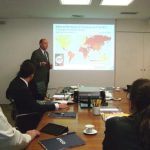In force since January 29 this year, the Anti-Corruption Law affects not only large corporations, but all small and medium-sized companies, especially those that have or intend to have commercial relations with the public sector. According to the new law, if an employee is caught in acts of corruption, the company is punished even without proof that it was aware of what was happening. The punishment provides for a fine that can reach up to 20% of the gross revenue of the previous year, inclusion of the company in a “black list” that prevents it from entering into contracts and receiving financial resources from public entities, suspension and closure of activities, arrest of those involved, among others So, now is the time to invest in prevention.
“The Anticorruption Law provides for different treatment between companies that are negligent in combating corruption and those that strive to prevent and prevent illicit acts. Companies that have internal audit policies, application of codes of ethics and conduct and incentives to denounce irregularities may have their sentences reduced, ”says Murillo Onesti, from Rodrigues Onesti & Lima Neto Advogados. Check below, ten tips to not have major problems with the anti-corruption law.
Creating an Effective Anti-Corruption Policy
The company's responsibility to ensure the correct understanding of the concept of corruption and the risks and sanctions that its practice involves is the primary role in adopting anti-corruption policies. Make employees aware of the need to conduct work without inadvertent involvement in illegal activities, after all, violation of laws, since the new law may be penalized individually with fines, imprisonments, etc. In addition, the implementation and application of such practice can be considered as a mitigation factor for the company's responsibility.
Formulation, application and dissemination of the company's strategic planning
Simple to create, this tool is very useful and should be shared among all employees, even those who do not have direct contact with public authorities, as it helps in the formation and maintenance of the company's culture.
Adoption and creation of manuals of conduct and codes of ethics
The company must create its own code, according to its reality. "You should not use models applied in other companies, as this does not work and can still cause problems", warns the lawyer, José de Souza Lima Neto.
Updates, training and courses
It is not enough to create the rules, it is necessary to disseminate and reinforce them periodically.
Creation of an open communication channel with employees
For Onesti, this is one of the main tools to be implemented in companies. "There must be this opening so that the facts can be investigated and act quickly, avoiding legal problems".
Adoption of accounting practices in accordance with legislation
The accuracy of the diaries, books, records and accounts is fundamental to all transactions / expenses (domestic and foreign) of the companies. Unusual payments, “unregistered” accounts, non-existent invoices or notes must be abolished, as well as deletion of books and records. The formula is simple. Would a third party, outside the company, understand the operation, how it was done, the parties involved, the beneficiaries and their reason? Transparency and document.
Periodic monitoring of legislation, including activity regulators
For lawyers, it is essential to keep up with the constant legislative changes, as often the new rules are not properly disclosed and the company may behave without knowledge.
Periodic audits
Internal audit procedures can initiate investigative and supervisory actions in order to ascertain whether the procedures adopted and the legislation are being applied correctly. Periodic audits, internal and external, are important risk control and management tools, applying transparency and efficiency in the conduct of the company's business. The audits, combined with solid Compliance programs, form diligent mechanisms to comply with the new legislation, being able to offer the necessary security in the event of an eventual fraud or administrative or judicial process.
Support and guidance from a legal department (internal or outsourced)
Fundamental arm, working in various segments of the company, the legal department contributes to the effectiveness of its transactions. Guiding and supporting compliance and auditing, it becomes an essential tool in the application, updating and development of anti-corruption policies.
Rigidity and efficiency in handling and storing documents and information
The agreement signed with a public agency or entity, which aims at the cooperation of the company that effectively collaborates with the investigations, is provided for in the legislation in question, called leniency agreement. The purpose of the agreement is to identify others involved, obtain documents, information, etc. quickly. The possibility of concluding the agreement, together with the need for transparency in relations and also individual and / or legal responsibility, demand a great need in the custody and maintenance of documents, information, activity records, etc. With the digital age this care becomes even more important.
Source: Seeco e Earth Portal






